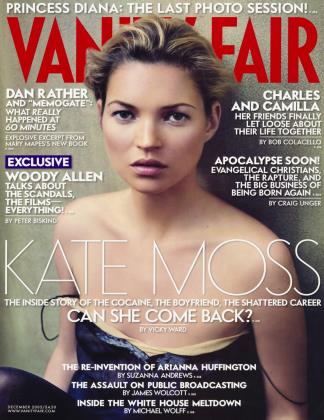Sign In to Your Account
Subscribers have complete access to the archive.
Sign In Not a Subscriber?Join NowThe 13th-century wisdom of the mystic poet Rumi is now a go-to phrase for Donald Rumsfeld and Angelina Jolie, Trick Daddy, and Al Gore. In the jittery first decade of the 21st century, "It is what it is" may be America's favorite way of explaining almost anything
December 2005 Jim Windolf Michael ElinsThe 13th-century wisdom of the mystic poet Rumi is now a go-to phrase for Donald Rumsfeld and Angelina Jolie, Trick Daddy, and Al Gore. In the jittery first decade of the 21st century, "It is what it is" may be America's favorite way of explaining almost anything
December 2005 Jim Windolf Michael Elins'It is what it is" has become the great American catchphrase, a mantra for an uneasy decade. Politicians like the sound of it. Hip-hoppers, businessmen, and movie stars say it all the time. It can be profound or meaningless, depending on the context. Poets use it and so do fools.
Dancer Kevin Federline uttered the phrase to express his love for his wife, Britney Spears, in an episode of the UPN reality show Britney & Kevin: Chaotic. New York Yankees star Alex Rodriguez said the same thing to reporters after making a costly error in a playoff game this fall. And Angelina Jolie said it on the Today show, when asked if she minded being branded the "other woman" in the Brad Pitt-Jennifer Aniston split.
Given its flexibility, it sits comfortably on both sides of the political aisle: Al Gore used it to show that he had accepted, to a degree, the fact that he had lost the protracted 2000 presidential election, and on Election Day 2004, George W. Bush reportedly told an aide, "I'm surprised, but it is what it is," when early exit-poll data erroneously suggested a John Kerry win.
Decades before its current vogue, "It is what it is" started popping up in the works of such writers as Holocaust survivor Erich Fried ("It is madness / says reason / It is what it is / says love"), the great 20th-century American poet Wallace Stevens ("The night knows nothing of the chants of the night / It is what it is as I am what I am"), and Beat novelist Jack Kerouac ("It Is What It Is and That's All It Is"). John Lennon sang it in his 1974 song "Scared."
The phrase has apparently been around, in some form, since the 13th century, when mystic Islamic poet and guru Jalal al-Din Rumi titled a collection of his lectures Fihi ma Fihi, a Persian expression loosely translated as It Is What It Is for a recent English-language edition. Roughly 700 years after Rumi, this tautological expression became a favorite of U.S. secretary of defense Donald Rumsfeld. Before the U.S. attack on Baghdad, Rummy said, "You can call that defense, as I do, or you can call it pre-emptive, but it is what it is."
But it's not just for tough-talking Republican administrators. Foulmouthed hip-hoppers Tony Yayo, E-40, D.M.X., Trick Daddy, and Ras Kass have rapped it. Country diva Wynonna Judd has belted it out, and sensitive singer-songwriter John Mayer has crooned it. R&B heartthrob Usher repeats "It is what it is" so many times in "It Is What It Is" that anyone hearing the song loses all concept of what it might mean in the first place.
Pro athletes positively rely on it, especially after losses. Sportswriters Gary Mihoces of USA Today and Adam Proteau of The Hockey News got so sick of "It is what it is" that they wrote columns decrying it. J. Daniel Janzen, of the online journal Flak Magazine, wrote a sharp 2003 piece focusing on its use by politicians (citing a few examples mentioned here).
If you're annoyed by this and other contagious phrases, you're not alone. "Americans have a tendency to have a negative attitude toward using set expressions," says Deborah Tannen, a professor of linguistics at Georgetown University and author of several books. "[But] language is fundamentally formulaic. We don't generate new sentences for every purpose.... I think the appeal of the phrase 'It is what it is,' the reason it can cut across such a wide range of users, is that the words are such basic words that it isn't marked for a particular social group. The usefulness of it is that it captures the existential acceptance that there are just some things in life you can't control."
Recent times have certainly demanded a lot in the way of existential acceptance, and the little phrase has followed eruptions of war and weather all across the globe. "It is what it is," a Saudi Arabia-based American man told The New York Times soon after Islamic terrorists killed 22 nonSaudi oil workers in the May 2004 siege at Khobar. More recently, a Mississippi woman identified as Mary Rose, who lost her home to Hurricane Katrina, told CBS News, "It is what it is. I don't even shed a tear."
Last year Paris Hilton thought she had come up with a pretty cool new catchphrase, "That's hot!" She even tried to trademark it. But she misjudged. After 9/11, 7/7, the South Asian tsunami, and Katrina, people seem more at ease with something more tentative and neutral-sounding. It just doesn't feel like a "That's hot!" kind of decade.
 View Full Issue
View Full Issue
























Subscribers have complete access to the archive.
Sign In Not a Subscriber?Join Now